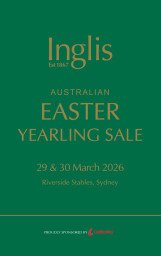23rd Feb 2009

Stallions - Graeme Kelly - Monday, 23 February 2009
With the Inglis Melbourne Premier Yearling Sale fast approaching, Graeme Kelly from Stallions, spoke to the sales company’s Victorian director Peter Heagney about the offering at Oaklands and other matters.
Q.: What is your feeling about the market as the Melbourne Premier draws near.
A.: The Australasian sales already conducted indicate the market is a little fragile. However, because we have approached all sales conscious of the world’s economic situation I think, generally, we have been pleasantly surprised how well the market has held up. The Australasian bloodstock market has been considerably stronger than the overseas markets and we are grateful for that. What is being highlighted even more so in recent years is that quality will still command good attention whilst horses with pedigree or conformation deficiencies are difficult to sell. As long as vendors are realistic in their assessment of their stock, they should experience satisfactory returns. At the same time our market has been very buoyant for a number of years and it was always going to be difficult to sustain that level.
Q.: How does this year’s catalogue compare with previous years.
A.: We are confident that we have assembled the best catalogue of yearlings we have been offered. We have also endeavoured to be selective in the type of yearling we have chosen to ensure our strike rate for selling good racehorses continues.
Q.: Are you pleased with the widespread of sires represented.
A.: We have all the best sires in Australasia represented and it is encouraging to see so many of the freshman sires showing promise with their two-year-olds.
Q.: The mix of first year stallions is interesting.
A.: Yes, I really enjoy seeing the progeny of first year stallions and this year we have a few surprise packets. I think we have a great array of first season sires represented and we really appreciate the confidence the studmasters, who stand those stallions, have shown in presenting a draft by the stallions at the Melbourne Premier.
Q.: What innovations can we expect at Oaklands this year
A.: Our partnership with Luxbet is very exciting for us and we feel both companies complement each other. Luxbet have been very generous to yearling purchasers with betting vouchers and will have a marquee at the sales to entertain clients and buyers. We have built a new 180-stable barn taking our stabling total to 820. This has allowed us to stable both Premier 1 and Premier 2 yearlings at the same time. It has been an expensive venture but we are confident it will be of benefit to vendors and the sale generally. We will also have a “precinct” of marquees situated adjoining the outside parade ring where Luxbet, RacingVictoria/SuperVOBIS and Aushorse will cater for guests as well as having four wineries offering cheese and wine tastings.
Q.: How has the response been from prospective buyers.
A.: It is really satisfying when the industry acknowledges that we have a good catalogue in Melbourne. There seems to be a very positive reaction to the catalogue so we are hopeful of a good return for those vendors, who have supported us.
Q.: Has Inglis been active with overseas promotions and do you expect a strong representation from overseas.
A.: More so than ever before. We have had delegations to Japan, Korea, Malaysia and Singapore, Hong Kong and South Africa and the response has been most encouraging. Our sale seems to sit in a comfortable price bracket for buyers from those countries and they are aware that the sale has an outstanding record for producing champions. Last season we had 2 Premier graduates, which were the highest rated horses in their category in the world in Weekend Hussler and Sacred Kingdom. We have also had a great start to the current two-year-old season with Rostova doing so well. We are encouraged by the interest being shown in South Africa. They, too, have seen how good our graduates are with Le Drakkar winning the Cape Guineas at Group 1 level. Added to that the exchange rate has made our sale even more attractive to overseas buyers to participate.
Q.: You have travelled overseas quite extensively of late. How do you think the overseas thoroughbred market will stand up in 2010 and beyond.
A.: It is difficult for me to assess the future of the market overseas as, although I have spent some time travelling, I do not claim to know the intricacies of their situation. I do know the mood is very sombre in the United Kingdom and I understand it’s a bit the same in the United States. South-east Asia seems less effected by the economic downturn at this time . . . in fact racing in Singapore is particularly strong and Malaysia has intentions of increasing stakemoney for its circuit by up to 50 per cent. It will be interesting to watch the development of racing in China – if they get serious about racing it will have a big bearing on the demand for horses. We are so fortunate in Australia that our stakemoney has remained at a high level and is actually increasing. In that regard there hasn’t been a better time in the last 10 to 15 years to buy a racehorse, because while prices are down prizemoney is still increasing. Don’t the astute stock market players invest when the market is depressed?
Q.: On a more personal note how are you coping with all the travelling.
A.: I have been doing it for over 30 years now but it has certainly intensified in the last eight to 10 years. We have had to pursue markets beyond our shores and the competition to attract buyers is highly competitive, not just from within Australia but from overseas countries as well. I enjoy travelling and whilst the novelty has well and truly worn off, I do get satisfaction from exploring new markets and consolidating existing ones. I have learnt to pace myself a bit better these days and the days of burning the candle at both ends have passed. I am fortunate that my wife Helen has accepted the life style I have chosen and the demands it makes on family life. It was particularly hard when our family was young but we have organised around it.
Q.: Do you have time for any activities or hobbies and is your wife Helen still active in the show ring.
A.: I hate to admit it but the bloodstock industry has been fairly all-consuming of my life. Lack of time saw my golf degenerate to a level where I gave it up and when I’m home at weekends I either go racing or spend time working on the small property we have at Diggers Rest. I do manage to enjoy the company of good friends and am partial to a long lunch. Helen still competes at shows and I attend as many of those with her as I can. She is not as competitive as she once was but she still enjoys attending agricultural shows and the Melbourne and Canberra Royals. I also still do some judging at shows and I enjoy that.
-thumb.jpg)
1, 2, 3 March 2026

29, 30 March 2026

20-25 February 2026

27 February - 3 March 2026

19 April 2026